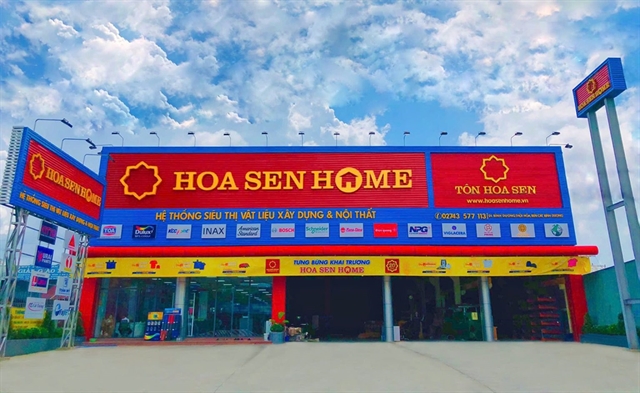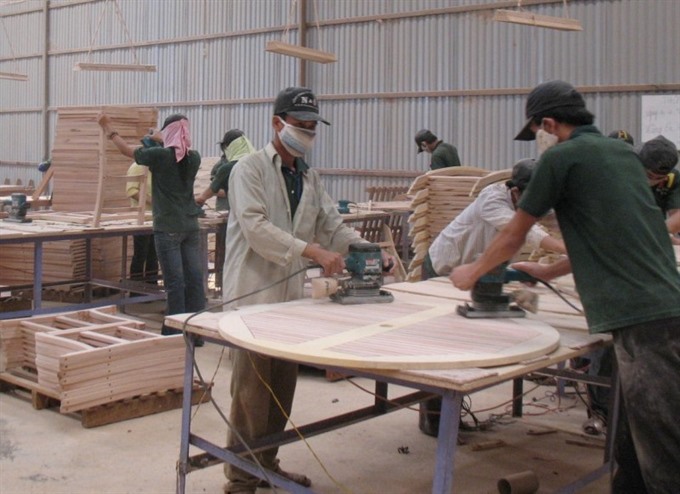 Economy
Economy

Furniture exporters should become more aware of import market regulations and standards in various countries, delegates said at a seminar held in HCM City yesterday.
 |
| Furniture exporters should become more aware of import market regulations and standards in various countries, delegates said at a seminar held in HCM City yesterday. — Photo baocongthuong.vn |
HCM CITY – Furniture exporters should become more aware of import market regulations and standards in various countries, delegates said at a seminar held in HCM City yesterday.
Huỳnh Văn Hạnh, deputy chairman of the Handicrafts and Wood Industry Association of HCM City, said that after removal of tariff barriers under free trade agreements, technical barriers would increase in many importing countries.
In addition to complying with legal sources of timber, furniture producers need to pay more attention to social responsibility during production and trading and improve the safety of their products, she said.
Producers must ensure that formaldehyde content on surface finishing, resins and wood and finishing products does not exceed the permitted level.
“Each market has its own requirements, so we must understand what we sell to markets and their requirements,” he said.
Scott Steady, product manager for chemical emissions testing and certification at UL Environment, said the US had strict safety regulations and standards to protect against risk of consumer products.
In July 2010, the Formaldehyde Standards for Composite Wood Products Act became part of the law of the Toxic Substance Control Act (TSCA) Title VI, he said.
In July, the US Environmental Protection Agency released a pre-publication of their rule that is consistent with TSCA, he said.
Formaldehyde is a colourless, flammable gas at room temperature and has a strong odour. Exposure to formaldehyde can cause irritation of the skin, eyes, noses and throat.
High levels of exposure may cause some types of cancer.
One of the primary uses of formaldehyde is in industrial resins and adhesives, including those used to make composite wood products, he said.
In addition, the US also has strict safety regulations and standards. Failure to meet either a CPSC regulation or an industry consensus standard can result in a recall.
Giuseppe Barisan, Global Operations director at UL Furniture and Furnishings Division, said more than 37 million residential products, including chairs, outdoor furniture and case goods, were recalled in the past two years in the US and EU markets due to a top-over or instability risk.
The consequences of a recall can damage a brand reputation and bear high costs, lawsuits and settlements.
Producers should thoroughly understand such regulations and standards and keep a close eye on changes to avoid risks when exporting their products, he said.
To reduce risk, companies need to strengthen their protocol, implement risk-based testing, and use third parties to conduct testing, he said.
Phạm Thị Thu Hằng, general secretary of the Việt Nam Chamber of Commerce and Industry, said that because of the country’s participation in many free trade agreements, the wooden industry was expected to develop strongly.
She urged local furniture firms to pay more attention to meeting consumer demand for environmentally friendly products, obtaining certificates such as GreenGuard, as well as conducting market research and building brands for their products.
According to Hạnh, Việt Nam ranked fifth in the world in wooden product exports.
Last year the country earned US$6.9 million from wood and wooden product exports, with the figure expected to reach $7.5 billion this year.
Global trade of wooden products was worth $467.7 billion a year, with exports from Việt Nam accounting for only 1.65 per cent. Thus, there is still more room for local wooden firms to expand their exports.
However, firms must focus more on improving their technologies and obtaining quality certificates to enable their products to penetrate more export markets, he said.
At the seminar, a representative of VPBank introduced credit packages reserved for wooden firms.
The seminar titled “Learn to Navigate Global Furniture Regulations to Expand Your Business” was organised by VCCI, Hawa, the Quality Assurance and Testing Centre 3Quatest 3 and UL Vietnam. — VNS